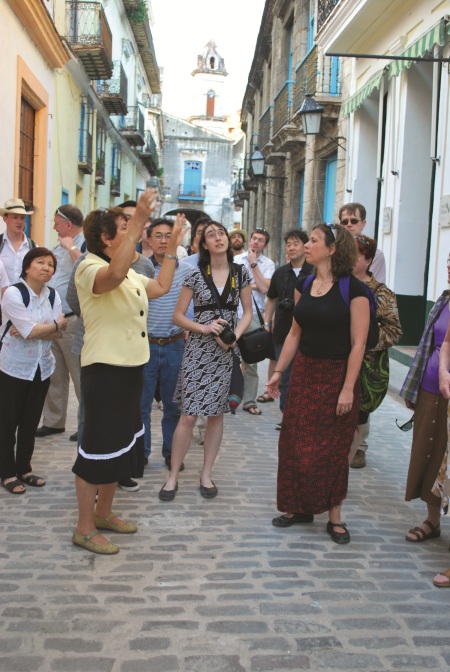Catedral de San Cristóbal, Havana. A glimpse into the pre-Communist past.
Cuba was for me an opportunity to become more aware of the lenses through which I view my world, and a chance to take those lenses off. In doing this, I could reconsider the relationship between a church (or the Church) and its context. As I tried to step outside of my usual way of thinking, I found at first I was very critical of churches in Canada. Having been presented with churches in Cuba that were serving the people in their communities (teaching skills to help supplement income, encouraging artistic expressions, providing food, running small business ventures and agricultural initiatives, etc.), I looked at the churches familiar to me and wondered what we did that came anywhere close to what these churches were accomplishing. I acknowledge that we must address issues differently because of our structures and social systems; however, the contributions of our churches are often hidden from the eyes of our communities and fall short of the efforts some of the Cuban churches have made to truly meet the needs of their communities.
Even while recognizing that we do accomplish some good, I find myself asking many questions about the purpose of the church. One Cuban lecturer during the trip said, “The church is not a group of friends; rather, the church is one of the instruments of God” to bring about the Kingdom of God.
I think this points to why I tend to be so critical of Canadian churches. I see a heavy focus on developing friendships and encouraging members to deepen their faith; however, I’m not always as convinced that the church sufficiently recognizes its role as being an instrument of God in terms of being the hands and feet and voice of Christ. I am not sure we always hear the cry of the people. I saw in the churches in Cuba a desire to not only help members (and the community) grow in their faith, but also to help them in their everyday living (on an individual level, community level, and national level). Today, I find myself thinking about what more we can do for our communities to better meet their needs.

I found I was challenged to think about outreach as well as the motivation behind community outreach. I have always known that community outreach is important, but after returning from Cuba I wonder if I need to add advocacy and social justice work to my understanding of community outreach. I believe the motivation behind outreach should be deeply rooted in theology, and theology should also shape how community outreach is practiced.
As I have continued to study scripture in light of this question, I find I am more and more convinced of the importance of active love, which can take many shapes, but most certainly includes meeting the physical needs of those around us. Returning then to further reflect on the Four Corners church, I wonder why it is that when this congregation moved towards an active love that sought to meet the needs of its community, the number of congregants declined? That when this church was invited to move beyond being an inward-looking entity that focuses on loving God, to instead embrace the call to love our neighbour and live the Christian life (as their minister called it), the church did not grow? I wonder then, what it is about us that makes us so resistant to living out the Christian life in such a way that it might actually cost us something? How is it that we can feel so comfortable with our Christianity if we’re not living up to what Christ has asked of us? I want to know what the future looks like for the Four Corners congregation—will they grow in numbers as they build a congregation around this new vision? Will the love they are pouring into their community speak of God’s love?
Attempting to engage a new perspective has left me with far more questions than answers, but I am convinced that the very practice of asking questions produces more fruit than always having the answers. I am also convinced that without the experience of travelling to Cuba and being pushed outside of my comfortable, familiar environment, I would have missed the opportunity to become aware of the lenses I use to view my world each day, and not have felt the challenge to remove them, even if only for a while.
About Heather Vanderstelt
Heather Vanderstelt is studying for her Master of Divinity degree at Knox College and is presently doing an internship at St. Joseph's Healthcare, Hamilton, Ont.

